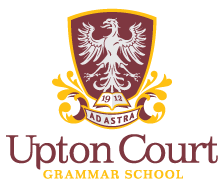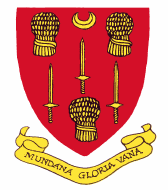
North Walsham is a market town and civil parish in Norfolk, England, within the North Norfolk district.

Upton Court Grammar School is a fully selective academy school in Lascelles Road, Slough, Berkshire.
In the universities of Oxford, Cambridge, and Dublin, Bachelors of Arts are promoted to the degree of Master of Arts or Master in Arts (MA) on application after six or seven years' seniority as members of the university. It is an academic rank indicating seniority, and not an additional postgraduate qualification, and within the universities there are in fact no postgraduate degrees which result in the postnominals 'MA'. No further examination or study is required for this promotion and it is equivalent to undergraduate degrees awarded by other universities.

King Henry VIII School is a coeducational independent day school located in Coventry, England, comprising a senior school and associated preparatory school. The senior school has approximately 800 pupils. The current fees stand at £13,785 per year, with bursaries and scholarships available. Due to its location close to Coventry railway station, the school accommodates pupils from around the West Midlands area, including towns at 30 miles' distance, such as Northampton, Warwick, Balsall Common, Leamington Spa, Kenilworth, Rugby and Nuneaton.
William Ellis School is a voluntary aided secondary school and sixth form for boys located in Highgate, London, England.

Wisbech Grammar School is an 11–18 mixed, Church of England, independent day school and sixth form in Wisbech, Isle of Ely, Cambridgeshire, England. Founded by the Guild of the Holy Trinity in 1379, it is one of the oldest schools in the country.

Borden Grammar School is a grammar school with academy status in Sittingbourne, Kent, England, which educates boys aged 11–18. A small number of girls have also been admitted to the Sixth Form. The school holds specialist status in sports.
Dover Grammar School for Boys (DGSB) is a selective secondary school located in Dover, United Kingdom, whose origins can be traced back to the Education Act of 1902. Originally founded as the Dover County School for Boys and Girls with locations behind the Dover Town Hall and on Priory Hill, the co-educational arrangements were early on prohibited by the Kent Education Committee. Dover Grammar School for Boys now occupies a prominent position overlooking the town of Dover on Astor Avenue. Its sister school is located in Frith Road and known as the Dover Grammar School for Girls (DGSG).
The Reverend William Lubbock MA BD (Cantab) was an English divine, Fellow of Caius College, Cambridge, and Church of England clergyman. He founded the famous English family of Lubbock.

Sir Roger Manwoods School is a selective grammar school located in the medieval town of Sandwich, Kent, England. The school was judged 'Outstanding' in all categories by Ofsted in 2012, including its boarding provision in 2018.
Dover Grammar School for Girls is a community grammar school for girls, aged between 11 and 16, and a joint sixth-form with boys between the age of 16 and 18, in Dover, England.

Paston is a village and civil parish in the English county of Norfolk. The village is 4 miles (6.4 km) north-east of North Walsham and 9.1 miles (14.6 km) south-east of Cromer. It is 19.2 miles (30.9 km) north-east of the city of Norwich. The village sits astride the coast road between Mundesley and Bacton. The nearest railway station is at North Walsham for the Bittern Line which runs between Sheringham, Cromer and Norwich. The nearest airport is Norwich International.
Retford Oaks Academy is a coeducational secondary school and sixth form located in the market town of Retford, Nottinghamshire, England, situated in the district of Bassetlaw.
The Bemrose School is a foundation trust all-through school situated on Uttoxeter New Road, Derby, England, with an age range of pupils from 3 – 19. Opened as a boys' grammar school in 1930, it became a co-educational comprehensive school in 1975. It then became an all-through school with the addition of a primary phase in 2014.

Oxnead is a lost settlement in Norfolk, England, roughly three miles south-east of Aylsham. It now consists mostly of St Michael's Church and Oxnead Hall. It was the principal residence of the Paston family from 1597 until the death of William Paston, 2nd Earl of Yarmouth in 1732. Under Sir William Paston (1610–1663), Oxnead was the site of several works by the architect and sculptor, Nicholas Stone, master-mason to Kings James I and Charles I.

Read School, Drax is a boarding, day, and independent school, based in the rural village of Drax, near Selby, North Yorkshire, England. Formerly a boys' school, it became co-educational in 1991. As of 2010 it hosts approximately 350 boys and girls between the ages of 3-18, comprising a senior school of approximately 280 and a junior school of around 70 children.

The Fakenham Academy is a coeducational secondary school and sixth form located at Field Lane Fakenham, Norfolk, England. The school offers GCSEs and BTECs as programmes of study. Pupils in the sixth form can choose to study from a range of A Levels and BTECs.
Weavers Academy is a co-educational secondary school and sixth form with academy status, located in Wellingborough in the English county of Northamptonshire.
Charles Robert Forder was Archdeacon of York from 1957 to 1972.
Sir William Paston, 1st Baronet, (1528–1610) was an English benefactor, and the father of Robert Paston, 1st Earl of Yarmouth.












